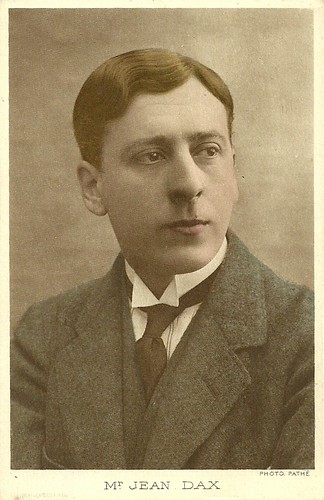Jean Dax (1879-1962) was a French actor who played in French and German films between 1909 and 1939. During the 1910s he was one of the main stars of the French silent cinema.

French postcard by Editions Cinémagazine, no. 147. Photo: Emera.
Jean Dax was born as Gontran Théodore Louis Henri Willar in Paris, France in 1879.
He made his film debut in 1909 and played that year in such short silent films as the Le Film d'Art productions Le luthier de Crémone/The Violin Maker of Cremona (André Calmettes, 1909) and L'Épi (André Calmettes, 1909) with Henry Krauss.
In the early 1910s, Dax often performed in films with music-hall star Mistinguett, as in L'épouvante/The Fright (Albert Capellani, 1911), in which Mistinguett plays herself, coming home and discovering a burglar under her bed.
Dax also co-acted often with leading actresses like Gabrielle Robinne. During the war of 1914-1918, he didn't act.
In 1919 Dax played in La Rafale/The Gust (Jacques de Baroncelli, 1921), with Fannie Ward, the American actress from The Cheat (1915). It was the story of a gambler, who cheats his friends and kills himself despite his friend's attempts to save him. In this period, Dax also played the lead in the Émile Zola adaptation L'assommoir/The Bat (Maurice de Marsan, Charles Maudru, 1921).

French postcard. Photo: Pathé.
In the 1920s, Jean Dax continued his career on stage as a popular vaudeville actor, but he also became a French film star who also acted in films in Germany. He played opposite Japanese star Sessue Hayakawa in La bataille/The Battle (Sessue Hayakawa, Édouard-Émile Violet, 1923) and opposite Chaplin's leading lady Edna Purviance in Education de prince/Education of a Prince (Henri Diamant-Berger, 1927).
Dax also played with stars of the German cinema: with Käthe von Nagy and Vivian Gibson in Die Durchgängerin/The Runaway Girl (Hanns Schwarz, 1928) and with Lil Dagover in Der geheime Kurier/The Secret Courier (Gennaro Righelli, 1928), an adaptation of Stendhal's Le rouge et le noir.
He also played opposite Italian actress Maria Jacobini and Czech actor Franz Lederer in Maman Colibri/Mother Hummingbird (Julien Duvivier, 1929).
When the sound film arrived, Dax's parts became smaller. However, he still had memorable roles such as Talleyrand in the French version of Der Kongress tanzt: Le congrès s'amuse/The Congress Dances (Jean Boyer, Erik Charell, 1931) and the old emperor Franz Joseph in Anatole Litvak's historical drama Mayerling (1936) starring Charles Boyer and Danielle Darrieux.
Jean Dax quit filming when the war was on the verge of starting. He died in 1962 in Paris, nearly forgotten. He was 83 (Some sources say 82). Dax was divorced from singer Jeanne Sauvage.

French postcard by Edition Pathé Frères. Photo: A. Bert.
Sources: Philippe Pelletier (CinéArtistes - French), Wikipedia (French) and IMDb.
This post was last updated on 5 December 2023.

French postcard by Editions Cinémagazine, no. 147. Photo: Emera.
Burglar under her bed
Jean Dax was born as Gontran Théodore Louis Henri Willar in Paris, France in 1879.
He made his film debut in 1909 and played that year in such short silent films as the Le Film d'Art productions Le luthier de Crémone/The Violin Maker of Cremona (André Calmettes, 1909) and L'Épi (André Calmettes, 1909) with Henry Krauss.
In the early 1910s, Dax often performed in films with music-hall star Mistinguett, as in L'épouvante/The Fright (Albert Capellani, 1911), in which Mistinguett plays herself, coming home and discovering a burglar under her bed.
Dax also co-acted often with leading actresses like Gabrielle Robinne. During the war of 1914-1918, he didn't act.
In 1919 Dax played in La Rafale/The Gust (Jacques de Baroncelli, 1921), with Fannie Ward, the American actress from The Cheat (1915). It was the story of a gambler, who cheats his friends and kills himself despite his friend's attempts to save him. In this period, Dax also played the lead in the Émile Zola adaptation L'assommoir/The Bat (Maurice de Marsan, Charles Maudru, 1921).

French postcard. Photo: Pathé.
Memorable roles
In the 1920s, Jean Dax continued his career on stage as a popular vaudeville actor, but he also became a French film star who also acted in films in Germany. He played opposite Japanese star Sessue Hayakawa in La bataille/The Battle (Sessue Hayakawa, Édouard-Émile Violet, 1923) and opposite Chaplin's leading lady Edna Purviance in Education de prince/Education of a Prince (Henri Diamant-Berger, 1927).
Dax also played with stars of the German cinema: with Käthe von Nagy and Vivian Gibson in Die Durchgängerin/The Runaway Girl (Hanns Schwarz, 1928) and with Lil Dagover in Der geheime Kurier/The Secret Courier (Gennaro Righelli, 1928), an adaptation of Stendhal's Le rouge et le noir.
He also played opposite Italian actress Maria Jacobini and Czech actor Franz Lederer in Maman Colibri/Mother Hummingbird (Julien Duvivier, 1929).
When the sound film arrived, Dax's parts became smaller. However, he still had memorable roles such as Talleyrand in the French version of Der Kongress tanzt: Le congrès s'amuse/The Congress Dances (Jean Boyer, Erik Charell, 1931) and the old emperor Franz Joseph in Anatole Litvak's historical drama Mayerling (1936) starring Charles Boyer and Danielle Darrieux.
Jean Dax quit filming when the war was on the verge of starting. He died in 1962 in Paris, nearly forgotten. He was 83 (Some sources say 82). Dax was divorced from singer Jeanne Sauvage.

French postcard by Edition Pathé Frères. Photo: A. Bert.
Sources: Philippe Pelletier (CinéArtistes - French), Wikipedia (French) and IMDb.
This post was last updated on 5 December 2023.
No comments:
Post a Comment